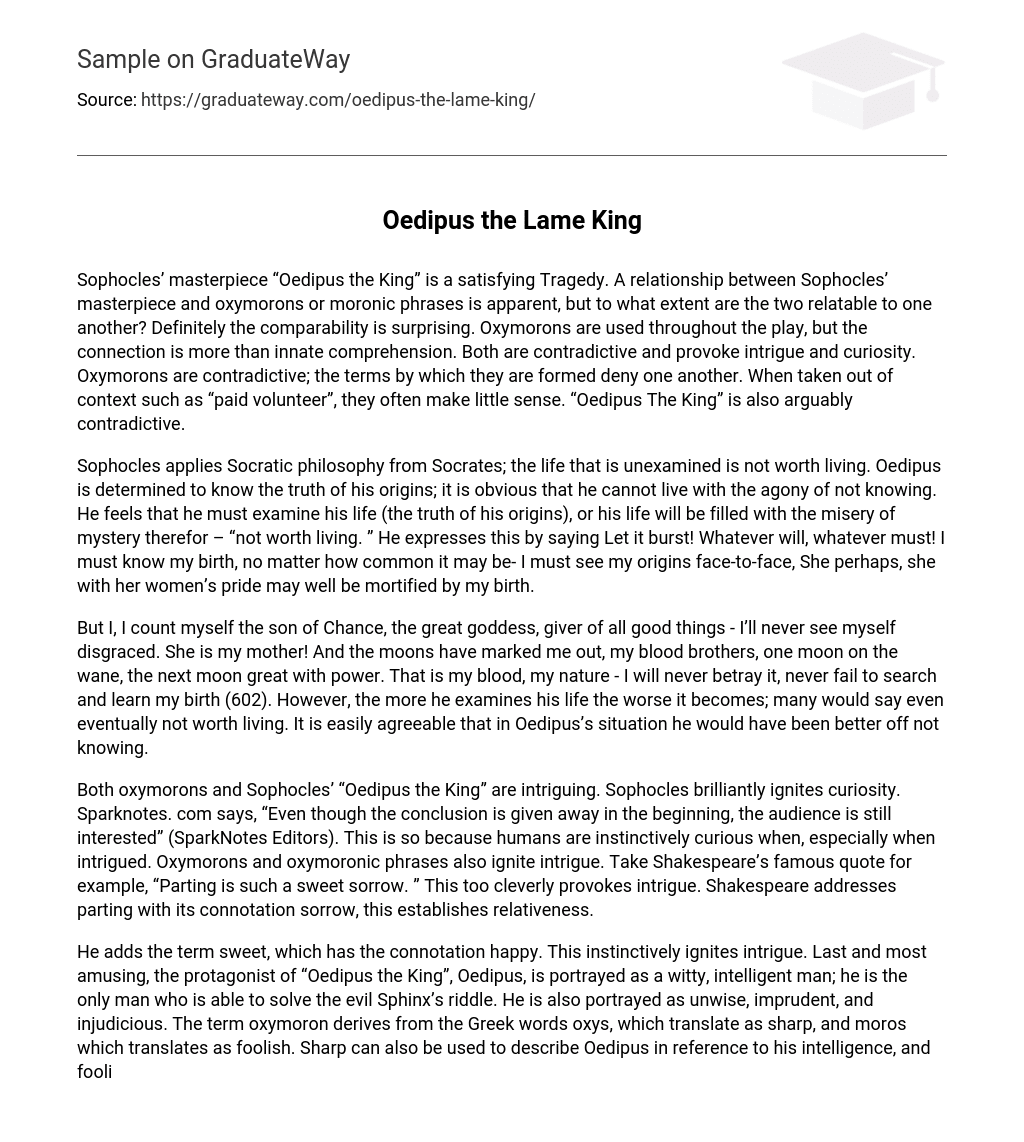Sophocles’ masterpiece “Oedipus the King” can be seen as a fulfilling Tragedy. The connection between this masterpiece and oxymorons or moronic phrases might seem unexpected, but they have a surprising level of similarity. Throughout the play, oxymorons are used, but the connection between the two goes beyond an inherent understanding. Both are contradictory and evoke curiosity and fascination. Oxymorons contradict themselves by combining terms that deny each other. They often seem nonsensical when taken out of context, like “paid volunteer”. “Oedipus The King” can also be seen as contradictory.
Sophocles applies Socratic philosophy from Socrates; the life that is unexamined is not worth living. Oedipus is determined to know the truth of his origins; it is obvious that he cannot live with the agony of not knowing. He feels that he must examine his life (the truth of his origins), or his life will be filled with the misery of mystery therefor – “not worth living. ” He expresses this by saying Let it burst! Whatever will, whatever must! I must know my birth, no matter how common it may be- I must see my origins face-to-face, She perhaps, she with her women’s pride may well be mortified by my birth.
However, I consider myself to be the son of Chance, the magnificent goddess who bestows all good things. I am certain that I will never bring shame upon myself. Chance is my mother! Moreover, the moons have chosen me, my blood brothers. One moon wanes while the next moon grows in power. This is the essence of my being, my heritage. I will always remain faithful to it and tirelessly seek the truth about my origins (602). Yet, the more he reflects on his life, the bleaker it becomes; many would argue that it eventually becomes unbearable. It is easy to agree that in Oedipus’s circumstances, he would have been better off remaining ignorant.
Both oxymorons and Sophocles’ “Oedipus the King” are fascinating. Sophocles effectively piques curiosity, as stated by SparkNotes.com, “Even though the conclusion is given away in the beginning, the audience is still interested” (SparkNotes Editors). This captivation arises from humans’ innate curiosity, especially when intrigued. Oxymorons and oxymoronic phrases also incite intrigue. For instance, take Shakespeare’s famous quote, “Parting is such a sweet sorrow.” This astutely evokes intrigue as Shakespeare juxtaposes parting with its inherent sorrow, thus establishing a connection.
The term sweet, with its association of happiness, naturally evokes interest. Additionally, in “Oedipus the King”, the main character Oedipus is portrayed as both clever and intelligent; he possesses the remarkable ability to solve the Sphinx’s riddle. However, he is also depicted as unwise, imprudent, and lacking good judgment. The origin of the term oxymoron can be traced back to two Greek words: “oxys” meaning sharp and “moros” meaning foolish. In terms of intelligence, Oedipus can be described as sharp yet ignorant at the same time.
The term “oxymoron” is derived from descriptions that accurately depict Oedipus, thus making the title “Oedipus the King” synonymous with “lame king,” and creating another oxymoron. Both oxymorons and “Oedipus the King” possess identical connotations, and Sophocles skillfully utilizes human emotions to provide entertainment. Tragedy itself is intriguing as it amplifies common issues among individuals in order to emphasize moral lessons. The brilliance of Sophocles, though anticipated, remains extraordinary. The play and oxymorons can attain a thought-provoking level of parallelism.
Works Cited
Sophocles’ play “Oedipus the King” is found in The Norton Anthology of World Literature, edited by Peter Simon et al. The anthology is published by Norton in 2009 and consists of one volume. The specific pages in the anthology where the play can be found are 573-614. This information can be accessed in print format.
SparkNotes Editors. “SparkNote on The Oedipus Plays.” SparkNotes.com. SparkNotes LLC. 2002. Web. 29 Nov. 2011.





